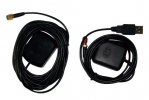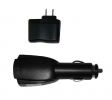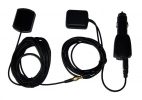- Joined
- May 14, 2013
- Messages
- 11,976
- Reaction score
- 8,442
- Location
- Oakland Park, Florida (USA)
- Country
- United States
- Dash Cam
- StreetGuardian.CAM Amazon.com
Hey everyone,
As you can imagine, I test many dashcam products in my office. I don't have a very strong GPS signal even with my desk being near a window. It’s been a bit frustrating but I've lived with it at my new office for several months now. Some days are better than others. I knew about pro GPS signal repeaters but they are normally quite large and also very expensive.
Searching around, I found one on Amazon for $30 and it works quite well. I drilled a hole in my office wall to run the coax cable & external antenna outside. I screwed in a washer and utilized the built-in magnet on the GPS antenna. I guess I could use an L bracket to aim it up towards the sky a bit more but it seems to be working well enough for now. I plugged the indoor antenna into the included USB wall charge power supply. I now have instant strong GPS signal anywhere in the office! (pleasantly surprised) This is perfect for indoor testers like me or people that have weak/no GPS signal in their vehicle.
*note I’m not affiliated with this product or seller in any way it’s just a project created from a need I had.
I made a little demo showing it in action with a Street Guardian SG9663DC dashcam and external GPS antenna.
ONETAK GPS Antenna Receiver Repeater
https://www.amazon.com/gp/B00D3BGKLQ

As you can imagine, I test many dashcam products in my office. I don't have a very strong GPS signal even with my desk being near a window. It’s been a bit frustrating but I've lived with it at my new office for several months now. Some days are better than others. I knew about pro GPS signal repeaters but they are normally quite large and also very expensive.
Searching around, I found one on Amazon for $30 and it works quite well. I drilled a hole in my office wall to run the coax cable & external antenna outside. I screwed in a washer and utilized the built-in magnet on the GPS antenna. I guess I could use an L bracket to aim it up towards the sky a bit more but it seems to be working well enough for now. I plugged the indoor antenna into the included USB wall charge power supply. I now have instant strong GPS signal anywhere in the office! (pleasantly surprised) This is perfect for indoor testers like me or people that have weak/no GPS signal in their vehicle.
*note I’m not affiliated with this product or seller in any way it’s just a project created from a need I had.
I made a little demo showing it in action with a Street Guardian SG9663DC dashcam and external GPS antenna.
ONETAK GPS Antenna Receiver Repeater
https://www.amazon.com/gp/B00D3BGKLQ


Attachments
Last edited:

